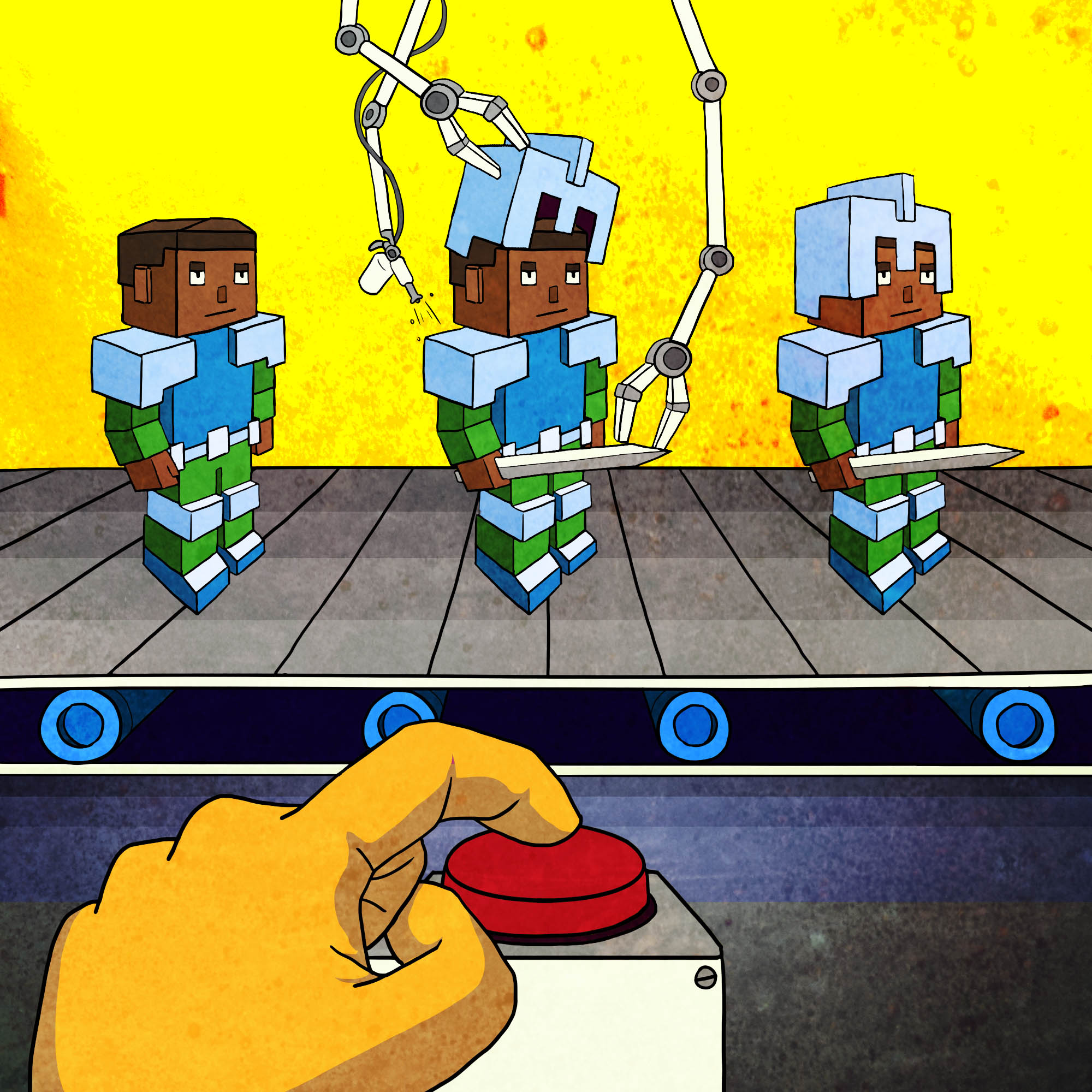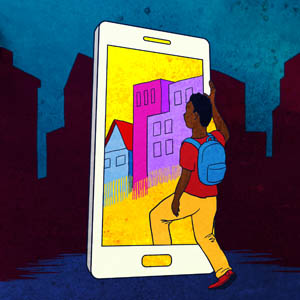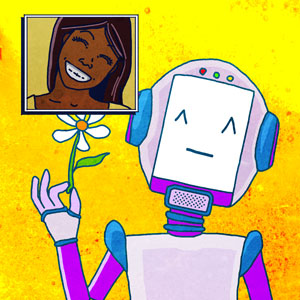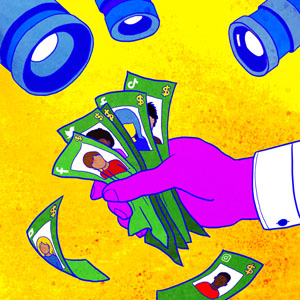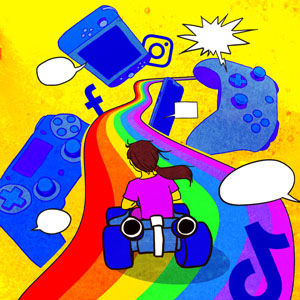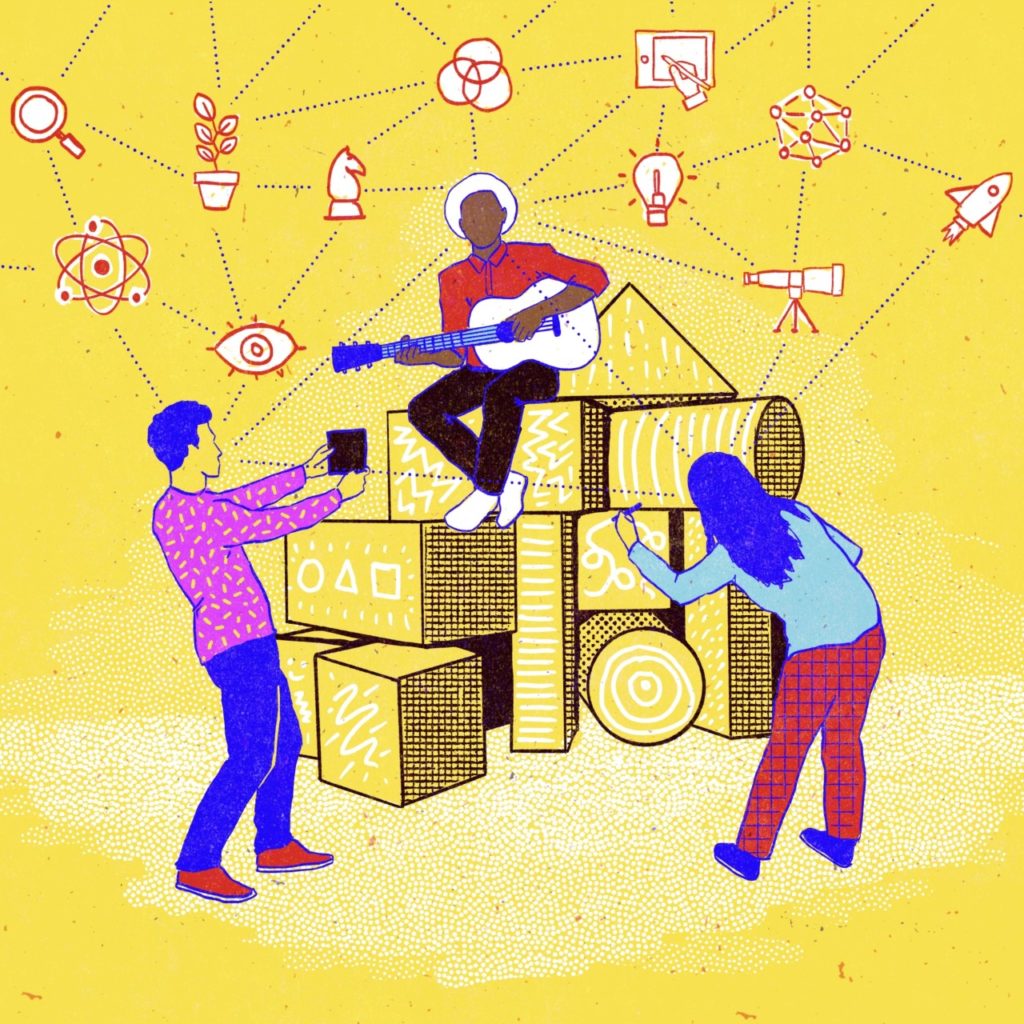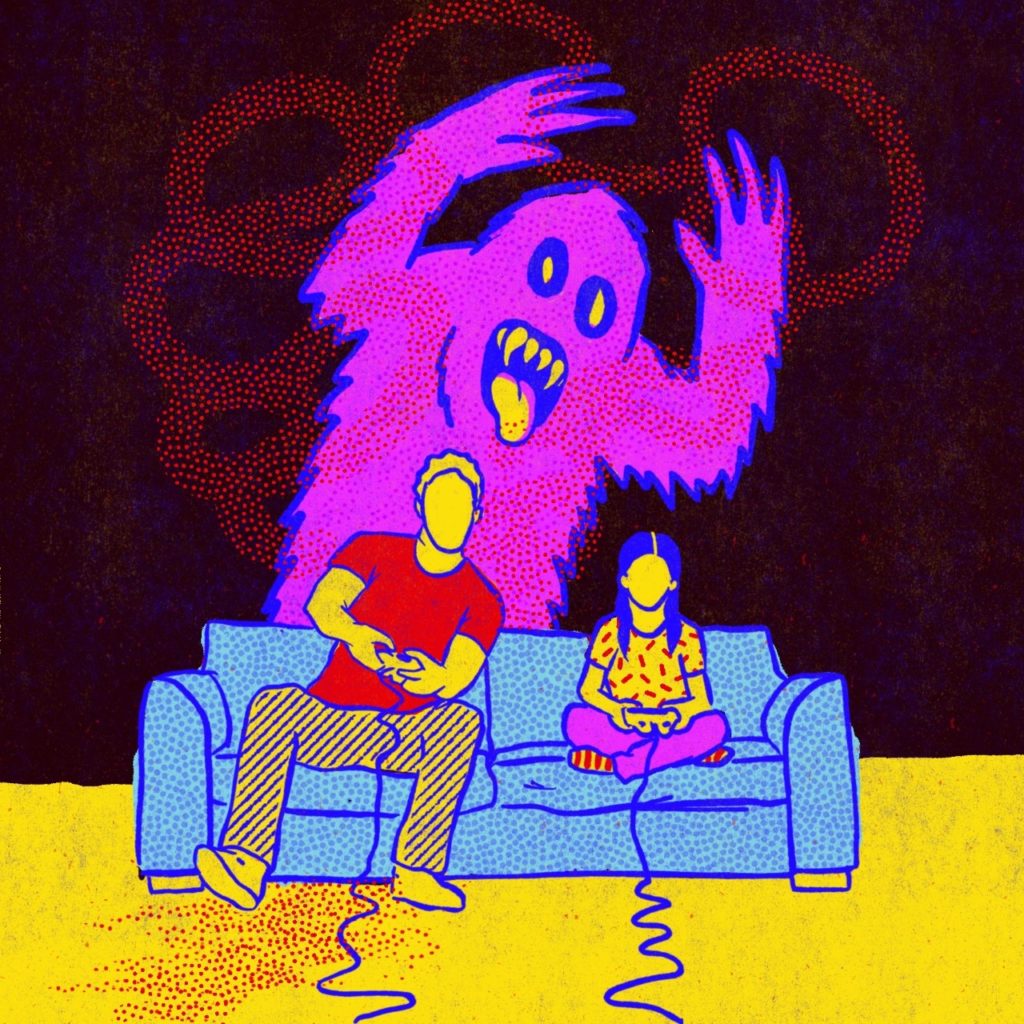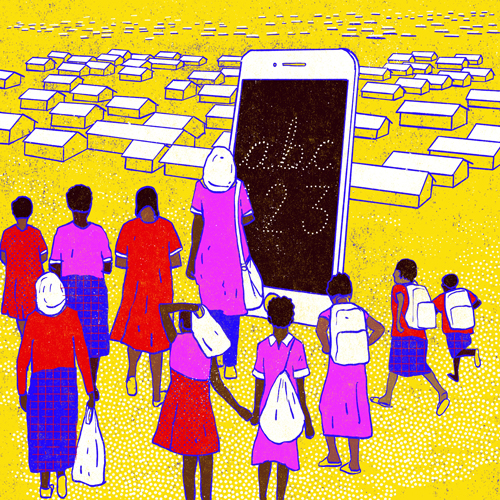
Conversations from the frontlines and behind the scenes of sociotechnical research
Critical Technology explores new and emerging research into the social, cultural, and political implications of new/recent technological developments, in the form of one-on-one interviews with the researchers and authors of the studies themselves.

In each episode, Sara Grimes (Director of the KMDI, 2018-2023) introduces a new academic publication or study that she thinks is a game changer for how we understand a particular technological application or innovation — its role, meaning, and impact on our lives. Through interviews with the lead author, Critical Technology delves into the specifics of that publication/study providing listeners with a firsthand account and insight into the work, its major findings and most wide-reaching conclusions, as well as how it fits within both the broader academic literature and our common knowledge about the technology examined.
Format: One-on-One Interviews
Frequency: Bi-monthly
Length: 30-35 minutes
Podcast Trailer
Season Three
Season Two
Season One
Trailer: Introducing the Critical Technology podcast
Season 3 Episode 4: Reactionary Digital Politics Part 2
 Games, memes, and parodies are increasingly used by extremist groups to spread misinformation and to lower the barriers to entry into extreme ideologies. But is there a deeper strategy at work? And if so, what’s the end game? In Part 2 of this special two part interview, Dr. Sara Grimes chats with three researchers from the Reactionary Digital Politics Research Group, a multi-disciplinary collaboration based in the UK that has spent the past five years tracking the rise and spread of extremist and alt-right political ideologies, rhetorics, and aesthetics online. Dr. Alan Finlayson is a Professor of Political and Social Theory at the University of East Anglia, in Norwich England, and the author of Making Sense of New Labour (Lawrence and Wishart, 2003). Dr. Robert Topinka is a Senior Lecturer in Transnational Media and Cultural Studies at Birkbeck, University of London, and the author of Racing the Street: Race, Rhetoric and Technology in Metropolitan London, 1840-1900 (University of California Press, 2020). And Dr. Rob Gallagher is a Lecturer in Film and Media in the Department of English at Manchester Metropolitan University and author of Videogames, Identity and Digital Subjectivity (Routledge, 2017).
Games, memes, and parodies are increasingly used by extremist groups to spread misinformation and to lower the barriers to entry into extreme ideologies. But is there a deeper strategy at work? And if so, what’s the end game? In Part 2 of this special two part interview, Dr. Sara Grimes chats with three researchers from the Reactionary Digital Politics Research Group, a multi-disciplinary collaboration based in the UK that has spent the past five years tracking the rise and spread of extremist and alt-right political ideologies, rhetorics, and aesthetics online. Dr. Alan Finlayson is a Professor of Political and Social Theory at the University of East Anglia, in Norwich England, and the author of Making Sense of New Labour (Lawrence and Wishart, 2003). Dr. Robert Topinka is a Senior Lecturer in Transnational Media and Cultural Studies at Birkbeck, University of London, and the author of Racing the Street: Race, Rhetoric and Technology in Metropolitan London, 1840-1900 (University of California Press, 2020). And Dr. Rob Gallagher is a Lecturer in Film and Media in the Department of English at Manchester Metropolitan University and author of Videogames, Identity and Digital Subjectivity (Routledge, 2017).
Season 3 Episode 3: Reactionary Digital Politics Part 1
 Digital technologies are increasingly used as ideological weapons of misinformation, manipulation, propaganda, and radicalization. But how exactly are social media platforms and memes used by ideological extremists? And what are they trying to achieve? In this episode, Dr. Sara Grimes (Director of the KMDI) chats with three researchers from the Reactionary Digital Politics Research Group, a multi-disciplinary collaboration based in the UK that has spent the past five years tracking the rise and spread of extremist and “alt-right” political ideologies, rhetorics, and aesthetics online. Dr. Alan Finlayson is a Professor of Political and Social Theory at the University of East Anglia, in Norwich England, and the author of Making Sense of New Labour (Lawrence and Wishart, 2003). Dr. Robert Topinka is a Senior Lecturer in Transnational Media and Cultural Studies at Birkbeck, University of London, and the author of Racing the Street: Race, Rhetoric and Technology in Metropolitan London, 1840-1900 (University of California Press, 2020). And Dr. Rob Gallagher is a Lecturer in Film and Media in the Department of English at Manchester Metropolitan University and author of Videogames, Identity and Digital Subjectivity (Routledge, 2017).
Digital technologies are increasingly used as ideological weapons of misinformation, manipulation, propaganda, and radicalization. But how exactly are social media platforms and memes used by ideological extremists? And what are they trying to achieve? In this episode, Dr. Sara Grimes (Director of the KMDI) chats with three researchers from the Reactionary Digital Politics Research Group, a multi-disciplinary collaboration based in the UK that has spent the past five years tracking the rise and spread of extremist and “alt-right” political ideologies, rhetorics, and aesthetics online. Dr. Alan Finlayson is a Professor of Political and Social Theory at the University of East Anglia, in Norwich England, and the author of Making Sense of New Labour (Lawrence and Wishart, 2003). Dr. Robert Topinka is a Senior Lecturer in Transnational Media and Cultural Studies at Birkbeck, University of London, and the author of Racing the Street: Race, Rhetoric and Technology in Metropolitan London, 1840-1900 (University of California Press, 2020). And Dr. Rob Gallagher is a Lecturer in Film and Media in the Department of English at Manchester Metropolitan University and author of Videogames, Identity and Digital Subjectivity (Routledge, 2017).
[expand title=”Read More”]
In the first of a special two part series, the Reactionary Digital Politics team discusses some of their findings, as well as key arguments advanced in Dr. Finlayson’s recent article, entitled “Neoliberalism, the Alt Right and the Intellectual Dark Web,” published in Theory, Culture & Society in 2021.
Recommended readings:
Finlayson, A. (2021). Neoliberalism, the Alt-Right and the Intellectual Dark Web. Theory, Culture & Society, 38(6), 167–190. https://doi-org.myaccess.library.utoronto.ca/10.1177/02632764211036731
Finlayson, A. (2022). YouTube and Political Ideologies: Technology, Populism and Rhetorical Form. Political Studies, 70(1), 62–80. https://doi-org.myaccess.library.utoronto.ca/10.1177/0032321720934630
The Reactionary Digital Politics podcast (https://reactionarydigitalpolitics.podbean.com)
[/expand]
Season 3 Episode 2: The Artist and the Automaton
While Dall-E, Stable Diffusion, and other popular AI-image systems have rekindled the debate about the future of creative work in the digital age, many cultural industries are already heavily reliant on machine learning and automation to produce content traditionally created by artists and designers. A key example is the digital games industry, where game engines, procedural content generation, and AI systems play an increasingly prominent role. In this episode, Dr. Sara Grimes (Director of the KMDI) chats with Dr. Aleena Chia, Lecturer in the Media, Communications and Cultural Studies Department at Goldsmiths, University of London, about her research on the ongoing transformation of creative work in the digital games industry. The discussion is focused on two of Dr. Chia’s recent articles: “The Artist and the Automaton in Digital Game Production,” published in Convergence (2022); and “The Metaverse, but not the way you think: Game engines and automation beyond game development,” published in Critical Studies in Media Communication (2022).
Suggested Readings
[/expand]Season 3 Episode 1: Land-based Relations in/and Digital Technology
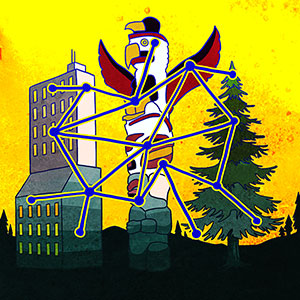
While Dall-E, Stable Diffusion, and other popular AI-image systems have rekindled the debate about the future of creative work in the digital age, many cultural industries are already heavily reliant on machine learning and automation to produce content traditionally created by artists and designers. A key example is the digital games industry, where game engines, procedural content generation, and AI systems play an increasingly prominent role. In this episode, Dr. Sara Grimes (Director of the KMDI) chats with Dr. Aleena Chia, Lecturer in the Media, Communications and Cultural Studies Department at Goldsmiths, University of London, about her research on the ongoing transformation of creative work in the digital games industry. The discussion is focused on two of Dr. Chia’s recent articles: “The Artist and the Automaton in Digital Game Production,” published in Convergence (2022); and “The Metaverse, but not the way you think: Game engines and automation beyond game development,” published in Critical Studies in Media Communication (2022).
[expand title=”Read More”]
Suggested Readings
Ansloos, J. (2017). The Medicine of Peace: Indigenous Youth Decolonizing Healing and Resisting Violence. Fernwood Publishing.
Ansloos, J. & Wager, A.C. (2020) Surviving in the cracks: a qualitative study with indigenous youth on homelessness and applied community theatre, International Journal of Qualitative Studies in Education, 33:1, 50-65.
Ansloos, J., & Dent, E. (2021). “Our spirit is like a fire”: Conceptualizing intersections of mental health, wellness, and spirituality with Indigenous youth leaders across Canada. Journal of Indigenous Social Development, 10(2), Article 2.
Caranto Morford, A., & Ansloos, J. (2021). Indigenous sovereignty in digital territory: a qualitative study on land-based relations with #NativeTwitter. AlterNative: An International Journal of Indigenous Peoples, 17(2), 293–305.
Ansloos, J.P. (2018). To Speak in Our Own Ways About the World, Without Shame”: Reflections on Indigenous Resurgence in Anti-Oppressive Research. In M. Capous-Desyllas and K. Morgaine (Eds.). Creating Social Change Through Creativity (pp. 3-19). Cham, Switzerland: Springer International Publishing AG.
[/expand]
Season 2 Episode 6: Debugging by Design
Although computing technologies are now ubiquitous in much of the West and other parts of the world, there are still significant inequalities when it comes to who has access to computer science education. Powerful cultural stereotypes about who is or can become a coder persist, leading to the underrepresentation of girls and children of colour from a crucial form of digital literacy.
In this episode, Dr. Sara Grimes (Director of the KMDI) chats with Dr. Deborah Fields, Associate Research Professor in the Instructional Technology and Learning Sciences Department at Utah State University, about her research on the relationship between identity, motivation and learning how to code among tweens and teens, and how to break down stereotypes about who can code and how. The discussion is focused on Dr. Fields’s recent article in the British Journal of Educational Technology: “Debugging by design: A constructionist approach to high school students’ crafting and coding of electronic textiles as failure artefacts,” co-authored with Dr. Yasmin B. Kafai, Luis Morales-Novarro, and Justice T. Walker (2021).
Suggested Readings
Fields, Deborah A., Kafai, Yasmin B., Morales-Novarro, Luis, and Walker, Justice T. (2021).
“Debugging by design: A constructionist approach to high school students’ crafting and coding of electronic textiles as failure artefacts,” British Journal of Educational Technology, 52, 1078-1092.
Fields, Deborah A., & Enyedy, Noel (2013). “Picking up the mantle of “expert”: Assigned roles, assertion of identity, and peer recognition within a programming class,” Mind, Culture, and Activity 20(2), 113-131.
Kafai, Yasmin B., Fields, Deborah A., & Searle, Kristin (2014) “Electronic textiles as disruptive designs: Supporting and challenging maker activities in schools,” Harvard Educational Review 84(4), 532-556.
Kafai, Yasmin B. & Fields, Deborah A. (2013). Connected play: Tweens in a virtual world. Cambridge, MA: The MIT Press.
Holbert, Nathan, Berland, Matthew & Kafai, Yasmin B. (Eds.) (2020). Designing Constructionist Futures: The Art, Theory, and Practice of Learning Designs. Cambridge, MA: The MIT Press
Papert, Seymour (1980). Mindstorms: Children, computers, and powerful ideas. Basic Books.
[/expand]
Season 2 Episode 5: The Digital Neighbour(hood)
How, where, and what kids and teens learn about safe sex, substance use, and other health-related topics is incredibly important. Especially for young people who are already dealing with higher risk factors, such as neighbourhood poverty and violence—a disproportionate number of whom are young people of colour, specifically Black, Latinx or Indigenous youth.
In this episode, Dr. Sara M. Grimes (Director of the KMDI) chats with Dr. Robin Stevens, Associate Professor at University of Southern California (USC) Annenberg School for Communication and Journalism, and the Director and founder of the Health Equity and Media Collab, about her research on Black, Latinx and LGBTQ+ youth’s use of social media, and the implications for their health and well-being. The discussion is focused on two of Dr. Stevens’s articles: “The digital hood: Social media use among youth in disadvantaged neighborhoods,” published in 2017 in New Media and Society; and “#digitalhood: Engagement with risk content in Social Media among Black and Hispanic Youth,” published in the Journal of Urban Health in 2019.
Suggested Readings
Stevens, R., Brawner, B.M., Kranzler, E., Giorgi, S., Lazarus, E., Abera, M., Huang, S., & Ungar, L. (2020). Exploring substance use tweets of youth in the United States: Mixed methods study. JMIR Public Health and Surveillance 6(1): p.e16191.
Stevens, R., Bleakley, A., Hennessy, M., Dunaev, J., & Gilliard-Matthews, S. (2019). #digitalhood: Engagement with risk content on social media among Black and Hispanic Youth. Journal of Urban Health 96: 74-82.
Lightfoot, M., Wu, N., Hughes, S., Desmond, K., Tevendale, H., & Stevens, R. (2018). Risk factors for substance use among youth experiencing homelessness. Journal of Child & Adolescent Substance Abuse 27(5-6): 288–96.
Stevens, R., Gilliard-Matthews, S., Dunaev, J., Woods, M.K., & Brawner, B.M. (2017). The digital hood: Social media use among youth in disadvantaged neighbourhoods. New Media & Society, 19(6): 950-67.
Dunaev, J. & Stevens, R. (2016). Seeking safe sex information: Social media use, gossip, and sexual health behavior among minority youth. Journal of Adolescent Health 58(2): S93.
[/expand]
Season 2 Episode 4: Kids and Emotional AI
As smart toys, virtual assistants, and machine learning apps spread across homes and schools, an increasing number of children are now living, learning, and growing up around artificial intelligence or “AI”. Yet, we still know very little about children’s relationship with AI, how they feel about the seemingly knowledgeable voices coming out of their electronic devices, or how AI responds to children’s feelings.
In this episode, Dr. Sara Grimes (Director of the KMDI) chats with Dr. Andrew McStay, Professor of Digital Life at Bangor University (Wales, UK) and Director of the Emotional AI Lab about the ethics and impacts of AI technologies designed to read and respond to our emotions, and their growing presence in children’s lives. The discussion is focused on two of Dr. McStay’s recent articles in the journal Big Data & Society: “Emotional artificial intelligence in children’s toys and devices: Ethics, governance and practical remedies,” co-authored with Dr. Gilad Rosner (2021), and “Emotional AI, soft biometrics and the surveillance of emotional life: An unusual consensus on privacy” (2020).
Suggested Readings
McStay, A., & Rosner, G. (2021). Emotional artificial intelligence in children’s toys and devices: Ethics, governance and practical remedies. Big Data & Society, January-June: 1-16.
McStay, A. (2020). Emotional AI, soft biometrics and the surveillance of emotional life: An unusual consensus on privacy. Big Data & Society, January-June: 1-12.
McStay, A. Rosner, G., Miyashita, H., & Urguhart, L. (2020). Comment on children’s rights in relation to emotional AI and the digital environment. Response to the UN Committee on the Rights of the Child call for submissions on General Comment 25.
McStay, A. (2018). Emotional AI: The Rise of Empathic Media. London: Sage.
McStay, A. (2014) Privacy and Philosophy: New Media and Affective Protocol. New York: Peter Lang.
[/expand]
Season 2 Episode 3: Black Girls Swim
Ongoing debates about how digital technologies impact children’s health and well-being often frame sports as the opposite or even antidote to sedentary screen time. For centuries, children’s sports have served as a symbol of a “good” childhood — one that privileges some children while historically excluding many others, especially girls, Black children, Indigenous children and children of colour. In this episode, Dr. Sara Grimes (Director of the KMDI) chats with Dr. Samantha White, Assistant Professor of Sport Studies at Manhattanville College (New York), about her work on children’s sporting cultures at the intersection of race and gender, and how mapping the history and politics of children and sports is crucial for understanding contemporary ideas about childhood. The discussion focuses on two of Dr. White’s recent articles, “Ebony Jr! and the Black Athlete: Meritocracy, Sport, and African-American Children’s Media” (Journal of Sport History, 2020), and “Black Girls Swim: Race, Gender, and Embodied Aquatic Histories” (Girlhood Studies, 2021).
Suggested Readings
White, S. (2020). Ebony Jr! and the Black Athlete: Meritocracy, Sport, and African-American Children’s Media. Journal of Sport History 47(2), p.128-142.
White, S. (2021): Black Girls Swim: Race, Gender, and Embodied Aquatic Historie. Girlhood Studies 14(2), p.63-79.
White, S. (2020). Sport. SAGE Encyclopedia of Children and Childhood Studies, p.1494-1496.
White, S. (2019). Negotiating Female Athletic Identity in Educational Spaces Through the Works of R.R. Knudson. Aethlon: The Journal of Sport Literature, 36(2), p.41.
[/expand]
Season 2 Episode 2: Child Data Citizen
We all know that the global data economy relies on the ongoing collection, exchange and use of massive amounts of our data – from personal information, to what we do online, to algorithmic forecasts about what we might to do in the future. But what about children’s data? Although there are special laws in place to protect children’s privacy in many regions around the world, huge amounts of their data are still being collected by a growing of devices and applications.
In this episode, Dr. Sara Grimes (Director of the KMDI) chats with Dr. Veronica Barassi, Professor in Media and Communication Studies at the University of St. Gallen, in Switzerland, about her research and theories of how childhood itself is being transformed by the production and manipulation of personally identifying digital data. The discussion is focused on key arguments and findings found in Dr. Barassi’s new book, Child Data Citizen: How Tech Companies Are Profiling Us from Before Birth, which outlines key trends contributing to a “datafication” of children and the troubling implications this has for their rights and futures.
Suggested Readings
Barassi, V. (2020). Child Data Citizen: How Tech Companies Are Profiling Us from before Birth. Cambridge, MA: The MIT Press.
Barassi, V. (2019). What tech companies know about your kids. TEDxMileHigh, November.
Barassi, V. (2019). Datafied Citizens in the Age of Coerced Digital Participation. Sociological research online 24 (3), p.414-429.
Barassi, V. (2017). BabyVeillance? Expecting Parents, Online Surveillance and the Cultural Specificity of Pregnancy Apps. Social media + society 3(2).
[/expand]
Season 2 Episode 1: Kids Across the Spectrums
There is incredible diversity in children’s relationships with digital technologies, which introduce a range of opportunities and challenges for their rights, learning, and wellbeing. Kids on the spectrum, however, must also contend with popular stereotypes and misinformation about autism and technology, which impact them in complex ways.
In this episode, Dr. Sara Grimes (Director of the KMDI) chats with Dr. Meryl Alper, Associate Professor in the Department of Communication Studies at Northeastern University Lab, about her ongoing research on the role of media and digital technologies in the lives of disabled children and their families. The discussion is focused on key findings and ideas found in Dr. Alper’s forthcoming book, Kids Across the Spectrums: Growing Up Autistic in the Digital Age, which challenges enduring myths about kids on the spectrum and reveals the cultural, social, and sensorial dimensions of how some of these kids use and relate to media and digital technologies in their everyday lives.
Suggested Readings
Alper, M. (2021). Critical media access studies: Deconstructing power, visibility, and marginality in mediated space. International Journal of Communication, 15, 840–861.
Alper, M. (2017). Giving Voice: Mobile Communication, Disability, and Inequality. Cambridge, MA: The MIT Press.
Alper, M. & Goggin, G. (2017). Digital technology and rights in the lives of children with disabilities. New Media & Society, 19(5): 726-740.
Coming Soon: Kids Across the Spectrums (the book), The MIT Press.
[/expand]
Season 1 Episode 6: Creativity Everything
Starting in the very first weeks of the global pandemic, a steady stream of news stories have revealed a fascinating increase in crafting, making, art work and various other forms of hands-on creative practice, as one response to the closures and stay-at-home orders. From building COVID-gardens and sewing home-made facemasks, to singing Sea Shanties on TikTok, many of us have turned to creative activities to pass the time, entertain our children, stay connected, or relieve some of our stress, loneliness, and general COVID fatigue. Academic research from a range of disciplines shows that engaging in hands-on creative activities does indeed have a myriad of benefits for individual health and well-being, and for social cohesion. According to Professor David Gauntlett, world renowned expert on creativity, the mere act of doing something creative in itself has enormous value: no matter the medium you use, and no matter how ‘good’ the output is. Creativity, he says, is something you do, not something that can be measured.
Dr. David Gauntlett is the Canada Research Chair in Creativity in the School of Creative Industries at Ryerson University in Toronto, where he is also the founder and head of the Creativity Everything Lab. His scholarship explores creative processes and the cultures that emerge around making and exchanging creative content, both online and off, by both professionals and hobbyists. Dr. Gauntlett’s cross-sector research links social analysis of the value of creative engagement with work relating to the media and creative industries, and he has worked with a number of the world’s leading creative organizations. He is the author or editor of 13 books, including Creative Explorations: New Approaches to Identities and Audiences (2007, Routledge), Making Media Studies: The Creativity Turn in Media and Communications Studies (2015, Peter Lang), and Making is Connecting: The Social Power of Creativity, from Craft and Knitting to Digital Everything (2nd ed. 2018, Polity Press). In this episode, Sara chats with Dr. Gauntlett (@davidgauntlett) about his upcoming book, Creativity: Seven Keys to Unlock Your Creative Self, and about his ground-breaking, deeply inclusive approach to studying and doing creativity.
Suggested Readings
Gauntlett, D. (2007). Creative Explorations: New Approaches to Identities and Audiences. Routledge Press: Abingdon, England/New York.
Gauntlett, D. (2018). Making is Connecting: The Social Power of Creativity, from Craft and Knitting to Digital Everything (2nd ed.). Polity Press: Oxford/New York.
Gauntlett, D. (2018). Creativity Everything talk in 12 mins. Summary of a talk presented at the Power Plant Gallery, November 15, Toronto, ON. [Video]. Youtube. https://www.youtube.com/watch?v=ht9iCzObH9A
[/expand]
Season 1 Episode 5: Transgressive/Toxic Play
Digital gaming is a vital source of fun, relaxation, learning and community for players of all ages and from around the world. During the past year, the social dimensions of digital gaming became the focus of renewed attention, as multiplayer games such as Fortnite and Among Us provided millions of players with engaging virtual forums for connecting with friends and loved ones during the stay-at-mandates and closures. Just like in physical contexts, however, not all of the social interactions that occur in digital games are positive and fun. Incidents of in-game trolling, harassment, doxing and other harmful behaviours are well documented in the literature and widely covered by the news media as evidence of a “toxic gamer culture.” An emerging approach to understanding this “dark” side of digital gaming is through the lens of transgressive play, which is explored in depth and from a range of disciplinary perspectives in the new edited collection Transgression in Games and Play (2019, The MIT Press). A key contribution to this discussion is found in the works of Dr. Kelly Boudreau, who positions toxic gameplay along a continuum with more mundane forms of problematic play and behaviour in order to better understand its emergence and its function within players’ lives and identities.
Dr. Kelly Boudreau is an Associate Professor in Interactive Media Theory & Design at Harrisburg University of Science and Technology (Pennsylvania). She is a sociologist and game scholar, and an expert on multiplayer game players and digital game cultures. Her work in this area is forging a new framework for studying transgressive behaviours in games, and in the surrounding games culture, as tactics that are commonly employed by players for boundary-keeping and identity maintenance. In this episode, Sara chats with Dr. Boudreau (@Velixious) about her chapter, “Beyond fun: transgressive gameplay, toxic and problematic player behaviour as boundary keeping,” as well as some of the key concepts and approaches she applies in her research, and the meaning and prevalence of problematic play.
Suggested Readings
Boudreau, K. (2019). Beyond fun: transgressive gameplay, toxic and problematic player behaviour as boundary keeping. In K. Jorgensen and F. Karlson (Eds.) Transgression in Games and Play. MIT Press: Cambridge, MA.
Boudreau, K. (2016). Managing mayhem from the top: gaming companies and communities [part of Herding Trolls, Legitimately: The Ethics of Online Community Management], presented at re:publica 10 Conference, July 12, Berlin, Germany. [Video]. YouTube. Starts at app 13:40.
Busch, T., Boudreau, K., & Consalvo, M. (2015). Toxic Gamer Culture, Corporate Regulation, and Standards of Behavior among Players of Online Games. In S. Conway & J. deWinter (Eds.) Video Game Policy: Production, Distribution, and Consumption. New York: Routledge.
[/expand]
Season 1 Episode 4: Distributed Blackness
Published just last year (2020, New York University Press), Dr. Andre Brock Jr’s Distributed Blackness: African American Cybercultures has already become a highly influential, widely cited, must read text for anyone interested in digital culture and technology. Through a theoretically rich and methodologically innovative analysis, that draws on critical race theory, critical discourse analysis, science and technology studies and history, Brock positions Blackness at the centre of Internet technoculture, its technological designs and infrastructures, its political economic underpinnings, its cultural significance and its emergent informational identities. Throughout this analysis, Brock explores how race and racism have always shaped how digital technologies are designed, used, depicted, and envisioned; while uncovering the vibrant, and oftentimes joyful, cultural commonplaces, diverse gatherings, and Black informational identities central to Black technoculture and digital experience.
Dr. Brock is an Associate Professor of Black Digital Studies in the School of Literature, Media, and Communication at the Georgia Institute of Technology. His interdisciplinary scholarship includes numerous published journal articles on racial representations in videogames, Black women and blogs, whiteness, Blackness, and digital technoculture, data ethics, as well as ground-breaking research on Black Twitter. In this episode, Sara chats with Dr. Brock (@DocDre) about some of the key terms and concepts introduced in his book, Distributed Blackness, his theoretical framework, and his notable methodological approach to studying and theorizing the information society.
Suggested Readings
André Brock. (2020, September 14) Distributed Blackness: African American Cybercultures [Video]. Georgia Tech Library. https://smartech.gatech.edu/handle/1853/63724
Brock, A. (2016). Critical technocultural discourse analysis . New Media & Society, 20(3), 1012–1030.
Brock, A. (2015). Deeper data: a response to boyd and Crawford. Media, Culture & Society, 37(7), 1084–1088.
Brock, A. (2011). “When Keeping it Real Goes Wrong”: Resident Evil 5, Racial Representation, and Gamers. Games and Culture, 6(5), 429–452.
[/expand]
Season 1 Episode 3: The City as Platform
The City as Platform project is an interdisciplinary research collaboration aimed at understanding the complex intertwining of artificial intelligence (AI), big data, and the surveillance society, as they converge and manifest within the design and lived experience of smart cities and other built environments. Key questions driving this project include “how do we understand the citizen’s right to the city,” how do such rights manifest within smart cities, and how can more equitable, accessible, and generative futures be designed and realized. The project brings together industry, government, and citizens through workshops and immersive experiences that invite a reconfiguration of smart city urban design, and a transformation of techno-centric to human-centered design practices. The team uses a combination of critical data analytics and ethnographic fieldwork to conduct research and foster dialogue across three cities: London, UK, New York, US, and Toronto, Canada.
Launched in 2013, with funding from the Social Sciences and Humanities Research Council of Canada (SSHRC), this game changer research collaboration is co-led by three Principal Investigators:
Dr. Beth Coleman, Associate Professor in the Institute of Communication, Culture, Information and Technology and at the Faculty of Information, University of Toronto.
Dr. Leslie Regan Shade, Professor at the Faculty of Information, University of Toronto.
Dr. Charles L. A. Clarke, Professor with the Cheriton School of Computer Science, University of Waterloo.
The project builds on theories developed by Dr. Coleman, which explore how AI systems and algorithms are reshaping the design and function of the technologies that surround us, and the impact this has on our lives, our relationships with the built environment, and our rights as citizens. This work expands on ideas first presented in Dr. Coleman’s book Hello Avatar (2011, The MIT Press), which explored the many modes of identity that emerge as we move between offline and virtual spaces. In City as Platform, Coleman delves into the aesthetic, civic and human dimensions of our new reality, shared with ubiquitous AI-driven technologies. In this episode, Sara chats with Dr. Coleman (@drbethcoleman) about some of the terms and concepts that are central to her important and timely theoretical contributions.
Suggested Readings
Coleman B. (2019). Bauhaus generative: Avant-garde to algorithmic aesthetics in three chairs. In L. Forlano, M. W. Steenson & M. Ananny (Eds), Bauhaus Futures (pp. 289-300). The MIT Press.
Coleman B. (2016). Let’s get lost: Poetic city meets data city. In Eric Gordon & Paul Mihailidis (Eds.), Civic Media: Technology, Design, Practice (pp.267-294). The MIT Press.
Coleman B. (2019). Technology of surround. Journalism & Mass Communication Quarterly, vol. 96, issue 2, pp. 351-366.
[/expand]Season 1 Episode 2: Educational Technologies in Refugee Camps
The Portraits of Education Change: Redefining Pedagogy & Technology in Refugee Camps project investigates the social and cultural conditions of how technology is used to mediate, facilitate, or support teaching and learning by students, teachers and the broader communities living in refugee camps. It seeks to fill an important gap in our knowledge of the human experience of teaching and learning in these contexts, where significant resources are going into educational technology as part of humanitarian aid and development funders’ response to the global youth refugee crisis. This project builds on the research team’s previous work, which shows that for refugees living in camps, a complex array of factors can make a particular technology valuable, and that teaching and learning can happen in diverse, social, peer-to-peer, and unexpected ways. Portraits of Education Change applies a participatory research design to identify the roles technology plays in supporting teaching and learning in the lived experiences and daily lives of women and men in the Kakuma (Kenya) and Dzaleka (Malwai) refugee camps.
The project builds on previous research conducted since 2011 across several different studies. In 2020, it received funding in the form of a Connaught New Researcher Award from the University of Toronto. The project is led by:
Dr. Negin Dahya, Assistant Professor in the Institute of Communication, Culture, Information and Technology and at the Faculty of Information, University of Toronto.
in collaboration with:
Dr. Sarah Dryden-Peterson, Harvard Graduate School of Education, Harvard University.
Dr. Olivier Arvisais, Département de didactique de la Faculté des sciences de l’éducation de l’Université du Québec à Montréal.
Portraits of Education Change combines education and media studies, feminist research methods, postcolonial theory, and critical race theories to identify the informal and emergent pedagogies that make the adoption of technologies by refugees in camps both possible and sustainable. In this episode, Sara chats with the project’s Principal Investigator and expert on digital media and learning, Dr. Negin Dahya (@MsNegin).
Suggested Readings
Dahya, Negin, Douhaibi, Dacia, Arvisais, Olivier, & Dryden-Peterson, Sarah. (2019). Social support networks, instant messaging, and gender equity in refugee education. Information, Communication & Society. VOL. 22, NO. 6, 774-790
Dahya, N., and Sarah Dryden-Peterson. 2016. Tracing Pathways to Higher Education for Refugees: The Role of Virtual Support Networks and Mobile Phones for Women in Refugee Camps. Comparative Education (December): 1–18.
Sarah Dryden-Peterson, Negin Dahya, & Elizabeth Adelman (2017). Pathways to Educational Success Among Refugees: Connecting Locally and Globally Situated Resources. American Educational Research Journal, vol. 54, issue 6, 1011-1047.
[/expand]Season 1 Episode 1: Platforms and Cultural Production
The Platforms and Cultural Production Project explores the recent shift of the cultural industries toward production and distribution systems embedded in digital platforms. Digital platforms in this context includes well known examples, like Facebook, Apple and Amazon, as well as industry-specific systems used predominantly by media/cultural producers (such as Unity for game development) that share many of the same properties and functions. The project examines the rise in prominence of these various digital platforms against the backdrop of wider transformations in the technologies, cultures, and political economies of digital media, through case studies from North America, Western Europe, Southeast Asia and China.
Launched in 2017, with funding from the Social Sciences and Humanities Research Council of Canada (SSHRC), this game changer research collaboration is co-led by three Principal Investigators:
Dr. Brooke Erin Duffy, Department of Communication, Cornell University
Dr. Thomas Poell , Faculty of Humanities, University of Amsterdam
Dr. David Nieborg , Department of Arts, Culture and Media and Faculty of Information, University of Toronto
Using an approach that combines media studies, political economy of communication, and cultural studies, the Platform and Cultural Production research team is tracking how the rise and spread of platforms is changing the cultural industries, and the growing impact of platforms on our everyday lives. In this episode, Sara chats with the team’s expert on the political economy of platforms, Dr. David Nieborg (@gamespacenl).
Suggested Readings
Social Media + Society volume 6, issue 3 (July – Sept. 2020) Special Issue: Platforms and Cultural Production
Social Media + Society volume 5, issue 4 (Oct.-Dec. 2019) Special Issue: Platformization of Cultural Production
Coming Soon: Platforms and Cultural Production (the book), Polity Press, Sept. 2021
[/expand]Critical Technology Creative Commons License
Attribution-NonCommercial-ShareAlike CC BY-NC-SA
![]()
The Critical Technology Podcast is under the Attribution-NonCommercial-ShareAlike Creative Commons license. This license lets others remix, tweak, and build upon your work non-commercially, as long as they credit you and license their new creations under the identical terms.
Contact Us
Got a question or comment? Email us: criticaltechpod.kmdi@utoronto.ca







